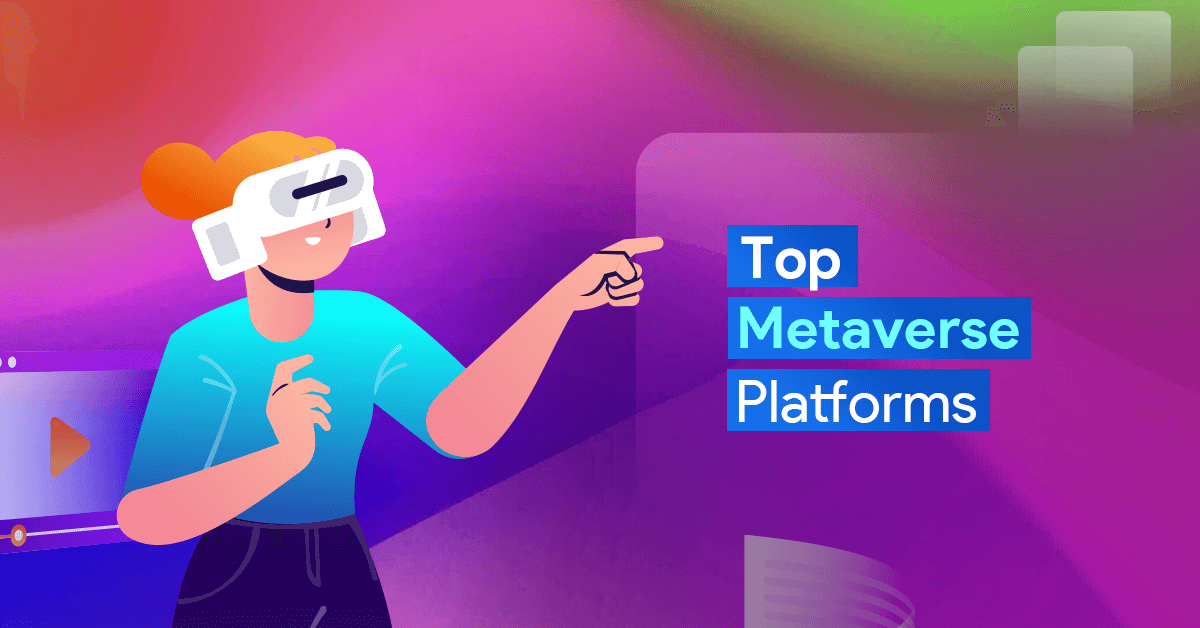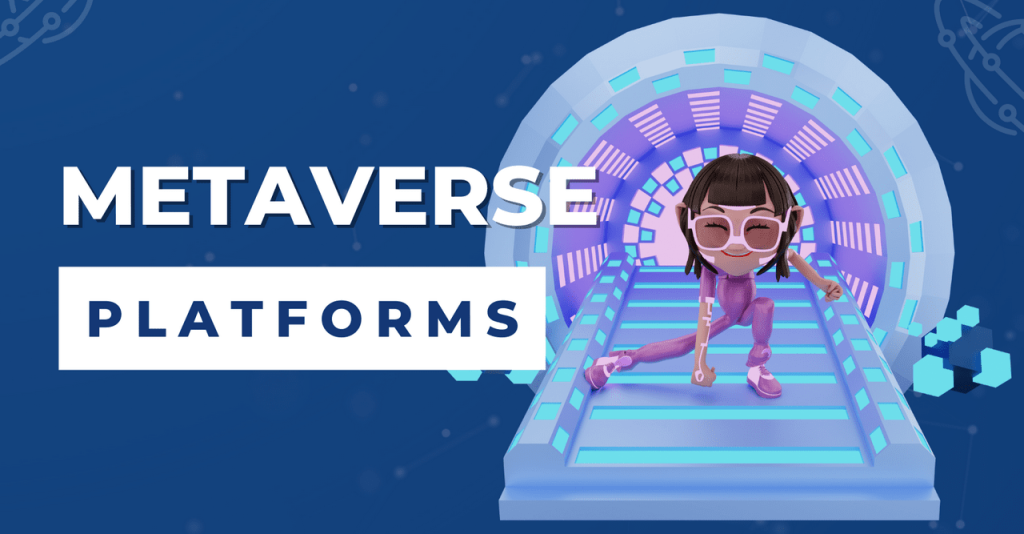
James Carter
What is Metaverse Platform?: Here’s What You Need to Know

The Metaverse, a term popularized by science fiction, has emerged as an intriguing concept that captivates the imagination of technologists, gamers, and futurists alike. It represents a virtual universe, an immersive digital space where users can interact with each other and the environment in real-time. In this article, we will delve into the world of Metaverse platform, examining their definition, components, key players, use cases, challenges, and future implications.
Understanding the Metaverse
Definition and Conceptual Framework of the Metaverse
The Metaverse can be defined as a collective virtual shared space, created by the convergence of physical and virtual reality, where users engage in various activities and experiences. It is an interconnected network of virtual worlds, supported by advanced technologies such as virtual reality (VR), augmented reality (AR), and also the internet.
Evolution and Origins of the Metaverse Concept
The concept of the Metaverse traces its origins to science fiction literature and movies, where it was portrayed as a fully immersive virtual reality realm. However, its real-world manifestation gained traction with the advent of VR technology, and also the subsequent development of online gaming communities and social platforms.
Key Characteristics and Distinguishing Features of the Metaverse
The Metaverse possesses several defining characteristics, including:
- Persistent: The Metaverse remains accessible and active even when users log off, with an ever-evolving environment.
- Shared Experience: Multiple users can simultaneously inhabit the same virtual space and interact with each other, blurring the line between real and digital interactions.
- User-Created Content: The Metaverse encourages user-generated content, empowering individuals to shape and contribute to the virtual environment.
- Scalability: Metaverse platforms are designed to accommodate large numbers of users and seamlessly scale with growing demand.
- Interoperability: Metaverse platforms prioritize interoperability, allowing users to transition between different virtual worlds and applications seamlessly.

Metaverse Platform: Definition and Components
Definition of a Metaverse Platform
A Metaverse platform refers to the underlying infrastructure that enables the creation, hosting, and operation of the Metaverse. It provides the necessary tools, technologies, and frameworks for developers, content creators, and users to engage and interact within the virtual space.
Core Components and Infrastructure of a Metaverse Platform
Virtual Reality (VR) and Augmented Reality (AR) Technologies
VR and AR technologies serve as the foundation of a Metaverse platform, providing immersive experiences that simulate real-world environments or overlay digital content onto the physical world. These technologies enable users to visualize and interact with the Metaverse in a more engaging and lifelike manner.
Social and Interactive Features
Metaverse platforms prioritize social interaction, fostering connections and collaborations among users. They offer communication channels, such as chat systems, voice chat, and avatars, enabling users to interact and engage with each other in real-time.
Content Creation Tools and Environments
Metaverse platforms empower users to create and customize their own virtual spaces and objects. They provide intuitive content creation tools, such as 3D modeling software, scripting engines, and asset libraries, allowing users to unleash their creativity and contribute to the Metaverse’s evolving ecosystem.
Blockchain and Cryptocurrency Integration
Blockchain technology plays a vital role in Metaverse platforms, facilitating secure ownership, transfer, and trade of virtual assets. Cryptocurrencies are often used as a medium of exchange within the Metaverse, enabling economic transactions and incentivizing user participation.
Cross-platform Compatibility and Interoperability
Metaverse platforms aim to transcend device boundaries and promote cross-platform compatibility. They support integration with various devices, including virtual reality headsets, smartphones, tablets, and personal computers, ensuring that users can access and participate in the Metaverse regardless of their chosen platform.
Key Players in the Metaverse Platform Landscape
Overview of Major Companies and Organizations Involved
The Metaverse platform landscape comprises a diverse range of companies, including technology giants, gaming companies, social media platforms, and startups. Some notable players in the Metaverse space include Facebook (Meta), Epic Games (creator of Fortnite), Roblox, Decentraland, and Niantic.
Leading Metaverse Platforms and Their Unique Offerings
Examples of Existing Metaverse Platforms
Roblox: Roblox is a user-generated content platform that enables users to create and play games within its virtual environment. It boasts a vast and diverse user base and offers a range of tools for content creation, game development, and social interaction.
Decentraland: Decentraland is a blockchain-based virtual world where users can buy, sell, and trade virtual land and assets using the Ethereum blockchain. Additionally It provides an open platform for developers to build immersive experiences and monetize their creations.
Fortnite: Although primarily known as a popular battle royale game, Fortnite has evolved into a Metaverse platform by introducing live events, virtual concerts, and collaborative creative modes. It emphasizes social interaction and community engagement.
Notable Partnerships and Collaborations in the Metaverse Space
To accelerate the development of the Metaverse, various companies have formed partnerships and also collaborations. For instance, Facebook (now Meta) has partnered with leading VR headset manufacturers, while Epic Games has collaborated with music artists and entertainment companies to host virtual concerts and events within Fortnite.
Use Cases and Applications of Metaverse Platforms
Gaming and Entertainment
Metaverse platforms have transformative implications for gaming and entertainment industries:
Immersive Gaming Experiences:
Metaverse platforms provide an immersive and interactive gaming environment where players can engage in multiplayer experiences, explore virtual worlds, and compete in diverse game genres.
Virtual Events and Concerts:
Metaverse platforms enable the hosting of virtual events, including concerts, conferences, and exhibitions, allowing people from around the world to participate in real-time, creating new avenues for entertainment and community engagement.
Education and Training
Metaverse platforms have the potential to revolutionize education and also training methodologies:
Virtual Classrooms and Simulations:
Metaverse platforms offer virtual classrooms and training simulations, facilitating immersive and also interactive learning experiences. Students can also collaborate, conduct experiments, and explore complex concepts in a safe and controlled virtual environment.
Skill Development and Training Programs:
Metaverse platforms provide opportunities for skill development through interactive training programs. Additionally users can acquire new skills, practice real-life scenarios, and receive feedback within the virtual environment.
Business and Commerce
Metaverse platforms open up new avenues for business and also commerce:
Virtual Marketplaces and Storefronts:
Metaverse platforms serve as digital marketplaces where users can buy, sell, and trade virtual assets, including digital art, virtual real estate, and in-game items. Additionally they provide new monetization opportunities for creators and businesses.
Virtual Conferences and Meetings:
Metaverse platforms enable businesses to host virtual conferences, meetings, and product launches, eliminating the limitations of physical location and offering more engaging and interactive experiences.
WATCH THE VIDEO BELOW
Challenges and Considerations in Metaverse Platform Development
Technical Challenges
The development of robust Metaverse platforms entails overcoming several technical challenges, such as network scalability, real-time synchronization, graphical fidelity, and hardware compatibility. Ensuring a seamless and also immersive user experience across different devices and platforms poses a significant technical hurdle.
Privacy and Security Concerns
The Metaverse raises concerns about user privacy and also data security. As users engage in immersive virtual experiences and share personal information within the Metaverse, it becomes crucial to implement robust security measures and privacy controls to protect user data and prevent unauthorized access.
Legal and Regulatory Implications
The Metaverse introduces complex legal and regulatory considerations. Intellectual property rights, virtual asset ownership, taxation, and user rights within the virtual space are among the legal issues that need to be addressed. Additionally the Governments and regulatory bodies must adapt and develop frameworks to govern the Metaverse’s emerging landscape.
Ethical Considerations
The Metaverse raises ethical dilemmas related to user behavior, content moderation, and also the potential for addiction. Ensuring responsible use, fostering inclusivity, and addressing issues of discrimination, harassment, and exploitation are critical aspects that need to be addressed in the development of Metaverse platforms.
Future Outlook and Implications
Predictions for the Future of Metaverse Platforms
The future of Metaverse platforms appears promising. Advancements in technology, increased investment, and growing user demand indicate a trajectory towards more immersive, interconnected, and feature-rich Metaverse experiences. Integration with emerging technologies like artificial intelligence, haptic feedback, and 5G connectivity will further enhance the Metaverse’s capabilities.
Potential Impact on Various Industries and Society
The impact of Metaverse platforms extends beyond gaming and also entertainment. Industries such as healthcare, architecture, retail, and social activism can leverage the Metaverse to innovate and improve their processes. Additionally, the Metaverse has the potential to redefine social interactions, education, and even reshape the concept of work.
Opportunities and Challenges for Individuals and Businesses
The Metaverse presents new opportunities for content creators, developers, businesses, and also entrepreneurs. Additionally It offers avenues for monetization, creative expression, and entrepreneurial ventures. However, it also poses challenges in terms of competition, discoverability, and the need for continuous innovation to stay relevant in a rapidly evolving Metaverse landscape.
Summary
The Metaverse platform represents a paradigm shift in the way we interact with digital spaces, blurring the boundaries between the virtual and also physical worlds. With its immersive experiences, social connectivity, and also limitless possibilities, the Metaverse holds significant potential for entertainment, education, and commerce. However, realizing its full potential requires addressing technical challenges, privacy concerns, legal considerations, and ethical dilemmas. As the Metaverse continues to evolve, it is crucial for individuals, businesses, and policymakers to navigate this new frontier responsibly and collaboratively, shaping a future where the Metaverse enriches our lives and experiences.
Latest
Gaming
19 Apr 2024
Gaming
16 Jan 2024
Gaming
31 Aug 2023
Gaming
24 Jun 2023
Gaming
24 Jun 2023













